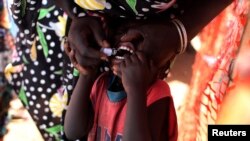NAIROBI —
Medical aid group Doctors Without Borders, known by its French acronym MSF, has scaled up its operation in conflict-torn South Sudan to contain a cholera outbreak.
More than 300 cholera cases have been recorded in South Sudan and more people suspected to be suffering from the disease are waiting for their medical results.
Brian Moller, head of the (MSF) mission in South Sudan, told VOA that the group is providing assistance to public health centers to treat the increasing number of cases.
He says MSF is doing its best to quickly identify cases and send patients to health centers for treatment, and has begun constructing a cholera treatment center in Gudele district, one of the areas most heavily affected by the outbreak.
In April, MSF vaccinated more than 10,000 displaced people against cholera in Malakal, Upper Nile State. The state capital has changed hands several times during more than five months of fighting between government and rebel forces.
Humanitarian workers warn the situation is dire and may worsen as the rainy season hits. Hundreds of thousands of people in South Sudan are living in displaced persons camps which are congested and lack clean water.
Moller says MSF will make intensive efforts in the camps, schools and the wider population to curb the spread of the disease, explaining that schools will be closed down by the government to avoid congestion of children in one place to break the spread of the disease.
On Thursday, speaking at a donor conference in Norway where the international community pledged more than $600 million in aid, the U.S. Special Envoy to South Sudan and Sudan, Donald Booth, called on South Sudan's leaders to honor promises they made.
Booth said it was important for the people of South Sudan that the fighting stop so that humanitarian aid can reach the needy population and also address the political issues underlying the conflict.
More than 300 cholera cases have been recorded in South Sudan and more people suspected to be suffering from the disease are waiting for their medical results.
Brian Moller, head of the (MSF) mission in South Sudan, told VOA that the group is providing assistance to public health centers to treat the increasing number of cases.
He says MSF is doing its best to quickly identify cases and send patients to health centers for treatment, and has begun constructing a cholera treatment center in Gudele district, one of the areas most heavily affected by the outbreak.
In April, MSF vaccinated more than 10,000 displaced people against cholera in Malakal, Upper Nile State. The state capital has changed hands several times during more than five months of fighting between government and rebel forces.
Humanitarian workers warn the situation is dire and may worsen as the rainy season hits. Hundreds of thousands of people in South Sudan are living in displaced persons camps which are congested and lack clean water.
Moller says MSF will make intensive efforts in the camps, schools and the wider population to curb the spread of the disease, explaining that schools will be closed down by the government to avoid congestion of children in one place to break the spread of the disease.
On Thursday, speaking at a donor conference in Norway where the international community pledged more than $600 million in aid, the U.S. Special Envoy to South Sudan and Sudan, Donald Booth, called on South Sudan's leaders to honor promises they made.
Booth said it was important for the people of South Sudan that the fighting stop so that humanitarian aid can reach the needy population and also address the political issues underlying the conflict.




